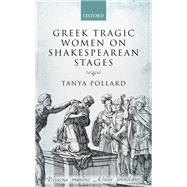Greek Tragic Women on Shakespearean Stages
, by Pollard, Tanya- ISBN: 9780198793113 | 0198793111
- Cover: Hardcover
- Copyright: 11/21/2017
Greek Tragic Women on Shakespearean Stages argues that ancient Greek plays exerted a powerful and uncharted influence on early modern England's dramatic landscape. Drawing on original research to challenge longstanding assumptions about Greek texts' invisibility, the book shows not only that the plays were more prominent than we have believed, but that early modern readers and audiences responded powerfully to specific plays and themes. The Greek plays most popular in the period were not male-centered dramas such as Sophocles' Oedipus, but tragedies by Euripides that focused on raging bereaved mothers and sacrificial virgin daughters, especially Hecuba and Iphigenia. Because tragedy was firmly linked with its Greek origin in the period's writings, these iconic female figures acquired a privileged status as synecdoches for the tragic theater and its ability to conjure sympathetic emotions in audiences. When Hamlet reflects on the moving power of tragic performance, he turns to the most prominent of these figures: 'What's Hecuba to him, or he to Hecuba/ That he should weep for her?'
Through readings of plays by Shakespeare and his contemporary dramatists, this book argues that newly visible Greek plays, identified with the origins of theatrical performance and represented by passionate female figures, challenged early modern writers to reimagine the affective possibilities of tragedy, comedy, and the emerging genre of tragicomedy.
Through readings of plays by Shakespeare and his contemporary dramatists, this book argues that newly visible Greek plays, identified with the origins of theatrical performance and represented by passionate female figures, challenged early modern writers to reimagine the affective possibilities of tragedy, comedy, and the emerging genre of tragicomedy.







